The Participatory Climate Action project enabled 11 municipal governments, 8 rural farmer organisations and 8 indigenous communities in both countries to become more resilient to climate change.
March 2022. With the aim of increasing the capacity for adaptation and mitigation to the adverse effects of climate change, the project “Participatory Climate Action: Integrating the challenges of climate change in the Greater American Chaco” (ACP) contributed to the sustainable and resilient environmental development of indigenous and rural farming populations in both countries. In turn, inter-institutional governance and the living conditions of various populations were improved. This EUROCLIMA+ project is led by the NGO Mingarã - Association for Sustainable Development (Paraguay) and the Plurales Foundation (Argentina).
Faced with the challenges of the Greater American Chaco region (made up of Argentina, Bolivia, Brazil and Paraguay), since June 2019 the ACP project has been implemented with a participatory environmental governance methodology, which allowed the creation of inter-institutional roundtables and enabled the development of local climate action planning processes with a focus on forest management and productive multifunctionality in Argentina and Paraguay.
Efforts were also focused on generating territorial demonstration pilots on key issues of forests, biodiversity and ecosystems. In essence, it allowed for the integration, strengthening and articulation of a Chaco perspective with new practices between regional strategic partners, local governments, civil society and grassroots organisations.
See the project map
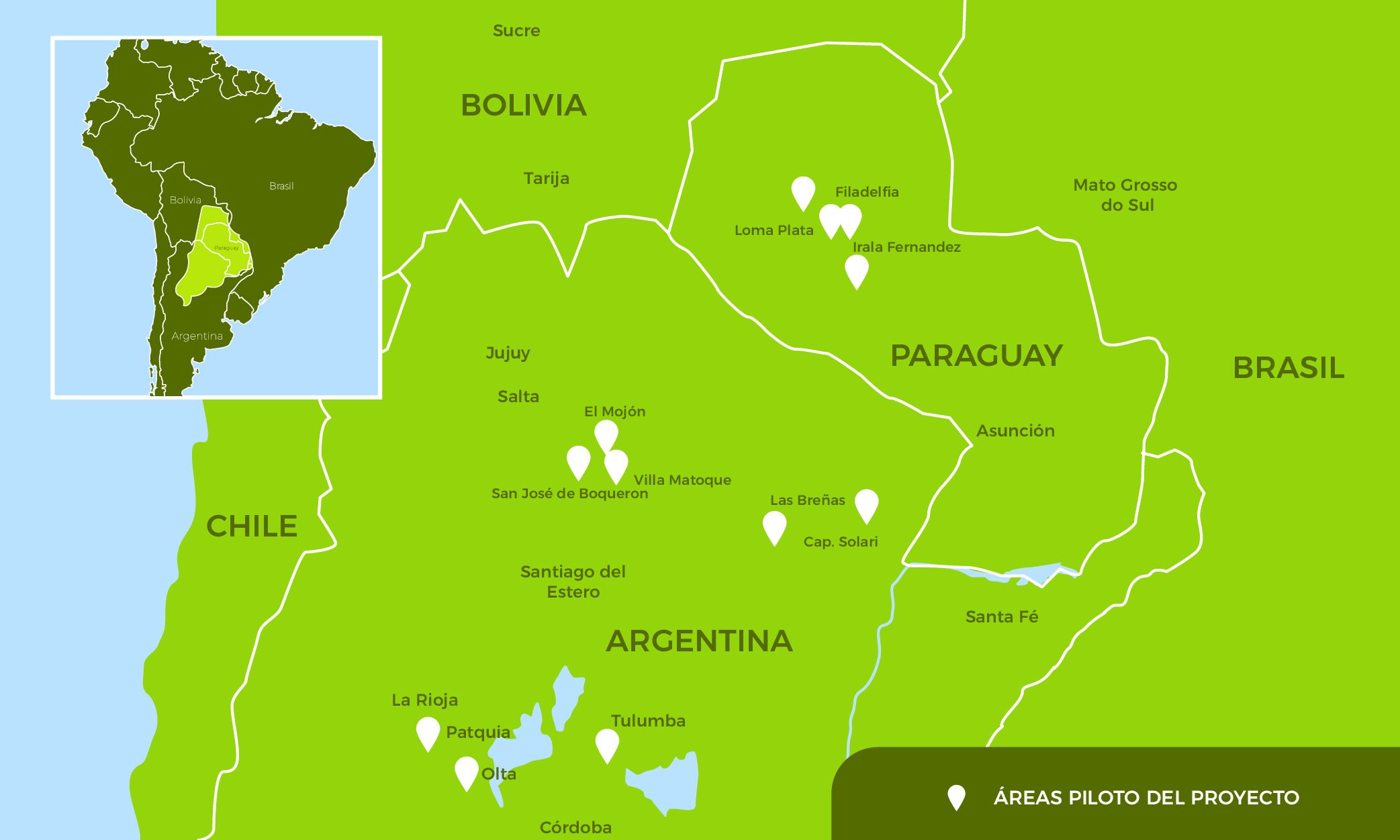 |
The project also contributed with indigenous and rural farmer organisations, sectoral dialogue tables and public institutions of the central government and some municipalities to generate new capacities and provided tools for the development of the management of a healthy environment with techno-productive options associated with the Chaco forest.
Communities in Paraguay adapt to climate change
In the American Chaco, and in the Paraguayan Chaco in particular, indigenous communities have a very strong bond with the environment. They share a spiritual, cultural and social relationship with their ancestral lands and ecosystems. These spaces are currently being degraded by factors related to climate change, causing new environmental problems such as prolonged droughts, floods and forest fires.
To address these problems, the ACP carried out an analysis of the fulfilment of the goals of four Local Climate Change Adaptation Plans 2017-2022 of the municipalities of Loma Plata, Filadelfia, Teniente Irala Fernández and Mariscal Estigarribia - local governments of the Paraguayan Chaco - that were in execution and it was observed that the actions aimed at indigenous communities were scarce and/or deficient, and being a group highly vulnerable to climate change, it was understood that they should be prioritised in the climate agenda. Faced with this scenario, the ACP project generated an analysis of the ways of life of the indigenous communities of Chaco and involved them in a process to develop actions with a focus on resilience to climate change. Therefore, joint and participatory work was carried out with 8 indigenous communities of the Guaraní Ñandeva, Ayoreo, Nivaclé and Enxet peoples in coordination with the Council of Indigenous Peoples in the promotion of adaptive practices in the face of climate change.
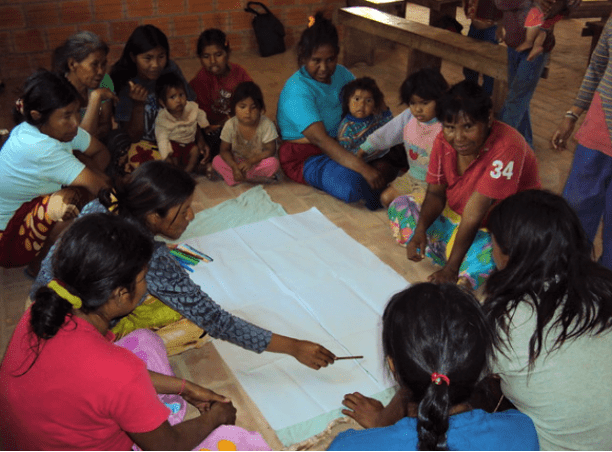 |
| Women from the indigenous community of Yalve Sanga (Paraguay) are trained to diversify handicraft production as a way of adapting to climate change. |
The actions include the rescue and use of wild vegetables for the preparation of food for sheep in the silvopastoral system; the recovery of coronillo plants from the forest that are currently used in the undergrowth pasture. Reforestation with fruit trees was also carried out, which has improved food security. The project also strengthened traditional handicraft work with fibres and wild vegetable dyes; generated opportunities to market a medicinal product made from wild vine leaves; and rescued the lotion made from aloe leaves from the forest, which is currently marketed.
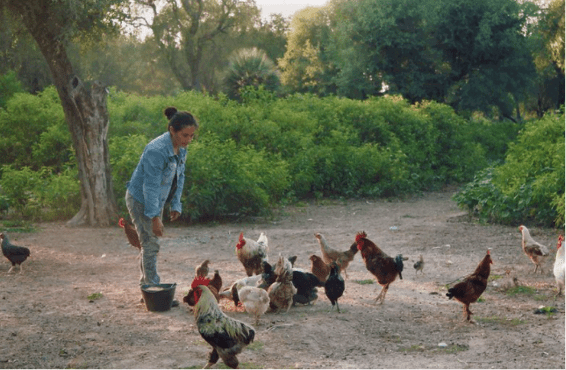 |
| Villages of the Yalve Sanga indigenous community come together to work on the construction of an ecological poultry farm |
The ACP project also achieved the recognition of the ecosystem services of the indigenous territories that were foreseen in the implementation process of the Municipal Plan for Adaptation to Climate Change of Filadelfia 2017-2022. At the same time, a Climate Finance Roundtable has recently been formed to support municipalities in the search for financial resources to develop forest preservation initiatives, particularly in vulnerable indigenous communities. Thamary Formosso, responsible for monitoring the project in Paraguay, explains that capacity building is one of the main benefits of the project.
“At the level of municipalities and local governments, institutions were strengthened with training, education and technical support in the implementation of their local adaptation plans. With respect to indigenous communities, they participated in the design of climate actions, and also in a process of interpretation of the climate change that affects their territories, thus generating a space for the rescue and revaluation of traditional knowledge and ancestral culture with respect to the management and conservation of forests," Formosso said.
As a result of the active involvement of indigenous communities and organisations, there was an opportunity to continue the initiative with funding from other local and international climate change partners.
Jorge Abbate, executive director of the NGO Gestión Ambiental (GEAM), which worked hand in hand with the project, argues that one of the key issues is related to the financing and sustainability of the activities.
“Together with the project, we have provided training so that municipal officials and communities can develop initiatives that can be presented to the international community. We are looking to go beyond the project's objectives, and we are creating the conditions to generate more resources and give continuity to the activities," says Abbate.
Municipalities in Argentina increase their resilience to climate change
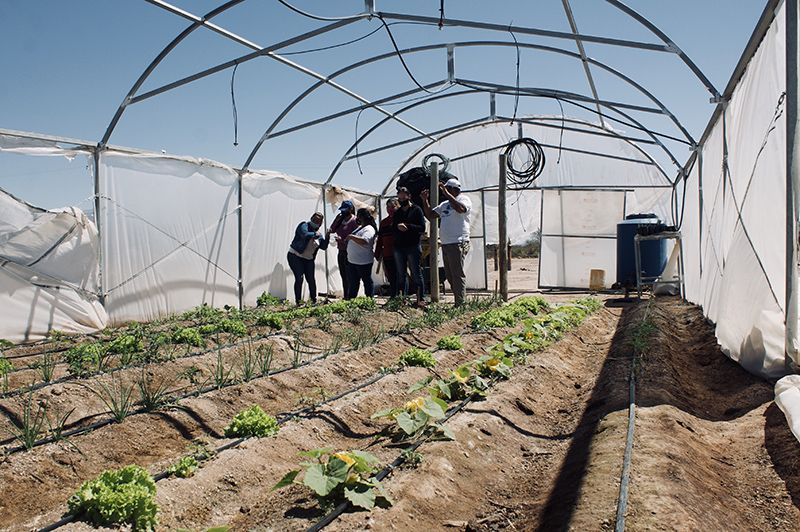 |
| Meeting with ACP member farmers' organisation in Santiago del Estero (Argentina) |
In Argentina's Gran Chaco, the socio-environmental scenario is complex. Climatic events (droughts and floods), the fall in rural employment, socio-environmental conflicts in the territories due to development (mining, extensive agricultural production, among others), and migratory processes increase the conditions of vulnerability. It is important to highlight this scenario because there is a direct relationship between the development of public policies, the participation of the actors involved and the dynamics of social inclusion of the rural farming population and indigenous communities.
In Argentina, as detailed in ACP research, it is the provinces that have power and jurisdiction over their territories, and existing public policies on forests, water and land have not significantly modified the major regional problems.
In this framework, the project made numerous contributions to rethink and reorient socio-environmental policies focusing on participatory environmental governance at the regional level.
With the intention of generating adequate knowledge about the problematic situation, a study on Forests, Water Management and Land Use was first developed, as well as a series of training, debate and exchange cycles to strengthen the design and management capacities of the multifunctionality of the forest in the Gran Chaco on issues of agroecology, access to water, forest management, productive options, initiatives with a gender perspective, community radio, digital literacy, among other topics.
One of the most outstanding actions of the project was the generation of tools for collective management of solutions to climate change through the Local Climate Action Tables and a proposed Climate Action Table[1]. These spaces were articulated with the Argentine Network of Municipalities against Climate Change and other organisations such as the SEDCERO Programme, RedTISA, the Environmental Defenders Programme, among others, to promote solutions at the territorial, local and regional level.
On the basis of the roundtables, different instruments were designed which, using participatory methodology, have enabled the integration of communities in socio-environmental solutions to address the effects of climate change. In this way, vulnerability analysis studies , greenhouse gas inventories and local climate action plans were drawn up in seven Argentinean municipalities: Villa Tulumba (Córdoba), Las Breñas (Chaco), Patquia and Olta (La Rioja) and El Mojón, San José del Boquerón and Villa Matoque (Santiago del Estero). Among the actions proposed in the local plans, "demonstration pilots" were defined to test technologies and management strategies in the rural areas of each locality.
Verónica Luna, territorial advisor and president of the Plurales Foundation, explains that the pandemic posed a great challenge, and despite the context, progress was made through the Roundtables, which allowed organisations and local governments to converge and make joint accessions to mitigate and adapt to climate change.
To complete the learning circuit proposed by the ACP, demonstration pilots were generated with the 8 participating farmers' organisations on different themes and with strategic partners working at regional level. For example, for the community water management pilots, we worked with the SEDCERO Programme to design and implement solutions in 5 territories. For water consumption, work was carried out in rural households on the implementation of rainwater harvesting systems with ferro-cement cisterns with a capacity to store up to 16,000 litres of water. And for the use of water in production, work was carried out on the farms of rural organisations using two types of technologies: a well with a water tower, and a dam to recharge pre-existing wells with a water tower for pumping and distribution.
These demonstration pilots enabled 5 rural organisations and their more than 300 members and their families to have new capacities and access to water services for consumption and production. The organisations involved were: the Asociación Reunidos por Un Sueño from Pampa del Zorro and the Asociación de Pequeños Productores de Pampa Ipora Guazú, both from Las Breñas, Chaco province; and the Frente de Mujeres del Salado Norte, the Asociación de Pequeños Productores de Alberdi (APPA) and the Unión de Pequeños Productores del Salado Norte (UPSAN), from Santiago del Estero.
Three other pilots were on agroecology and climate resilient food with the organisations Mujeres Libres del Norte Cordobés (Córdoba), Mujeres Campesinas Organizadas (La Rioja) and Reunidos por un Sueño (Chaco). These activities focused on the creation of poultry farms, the production of carob flour and fruit trees, with technical support from the National Engagement Strategy in Argentina, the Network of Technologies for Social Inclusion and the Environmental Defenders Programme.
Another demonstration pilot was on reforestation with native seeds, and work was carried out with the El Chacho Cooperative (La Rioja) on improving the irrigation system, the production of seedlings and carob seeds, the latter being a very important Chaco tree. The Municipality of Las Breñas (Chaco) and the Municipality of Villa Tulumba (Córdoba) were an active part of the Forestation 2021 project of the Argentinean Network of Municipalities facing Climate Change.
The last demonstration pilot project was with the eight farmers' organisations mentioned above, which are grouped together in InDiChaco, a rural digital inclusion initiative. In this case, the ACP provided personal computers and access to computer programmes, trained people in digital literacy in each territory, and held face-to-face training workshops for members of the farmers' organisations. As a result, more than 113 people now have materials and new skills that allow them to learn about new options for improving rural connectivity.
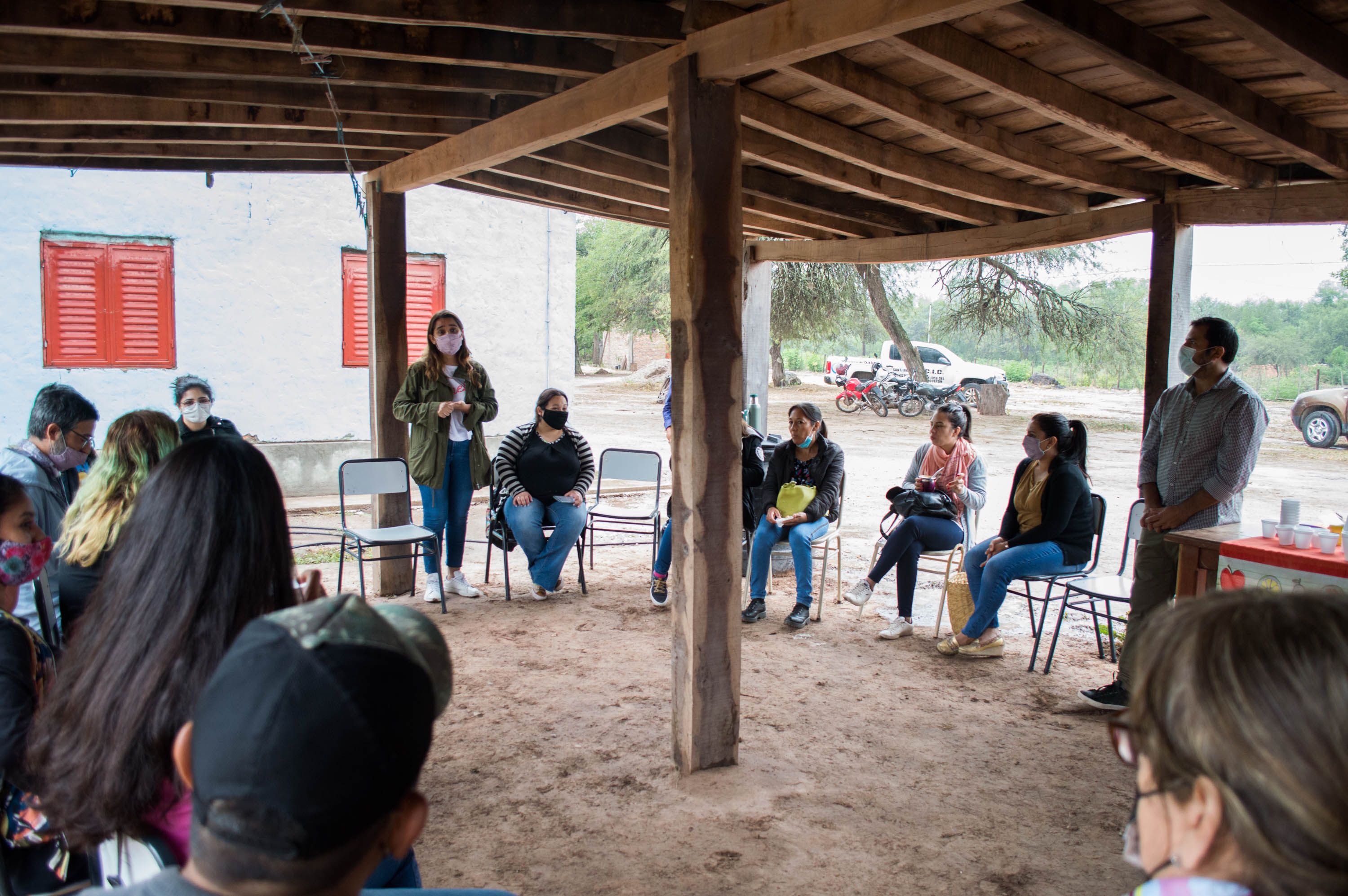 Local planning workshop in communities of Santiago del Estero (Argentina) Local planning workshop in communities of Santiago del Estero (Argentina) |
Sebastián Peralta, Mayor of the Municipality of Villa Tulumba (Córdoba), says that the project has helped citizens to understand the problems surrounding climate change and the solutions that can be proposed.
“With the small ideas that are developed in the community and from the educational guidance received, something big is built that contributes to the reduction of the effects of climate change. In Tulumba, various actions were taken on a daily basis, such as separating waste, recycling, reusing forest residues that can contribute to the development of fertile soil. We also managed to work with renewable energy through solar panels, among others," Peralta pointed out.
Silvana Medina Laola, Secretary of Health and Environment of the Municipality of Las Breñas, Chaco, says that the project accompanied them, supported them and gave them guidelines for developing actions to confront climate change.
Governance to address climate change in the American Chaco
The project's actions were implemented in seven municipalities in Argentina and four in Paraguay, and the lessons learned show that it is possible to extend them to all municipalities in the Chaco region. The strategy is designed with the characteristics of this semi-arid region in mind, where rural farming and indigenous populations are scattered throughout the territory, and the municipalities face problems associated with climatic events such as prolonged droughts and short-term floods. For this reason, ACP proposes an integral solution that can be scaled up and projected in the Chaco region.
On the other hand, in Brazil, Central America and other areas of Latin America there are other semi-arid regions that share socio-environmental characteristics with the Greater American Chaco, therefore, it is possible to replicate the actions of the ACP because they generate new capacities for participatory environmental governance.
Paula Juárez, coordinator of the project in Argentina, argues that a key issue for governance and for the process of capacity building is the development of actions in the territories.
“We worked hard with indigenous and rural farming organisations in each of the territories, implementing different strategies to improve the quality of life and the forms of production and coexistence with the forest," Juarez concludes.
[1] The Interlocal Tables are implemented in the context of the Local Plans, which emerge from the demonstration pilots.
DATA:
- Participatory Climate Action: Integrating climate change challenges in the Greater American Chaco is a project belonging to the Euroclima+ programme, within the Forest, Biodiversity and Ecosystems (FBE) Sector, funded by the European Union, with the implementing agencies GIZ and Expertise France. Learn more here.
- The 7 local roundtables and the interlocal roundtable on Climate Action in Argentina are made up of local governments, representatives of rural farming and civil society organisations, Fundación Plurales, the SEDCERO Programme, RedTISA, ENI-Argentina, and the Environmental Defenders Programme (EU).
- The Climate Finance Roundtable in Paraguay is made up of civil society organisations, Gestión Ambiental (GEAM) Mingarã, other organisations such as Alter Vida, Fundación AVINA, Fundación Moisés Bertoni, Guyra Paraguay, and Asociación para la Conservación de la Vida Silvestre (WCS Paraguay).
Article about the project
Among the studies produced by the project are:
- Vulnerability Analysis, Greenhouse Gas Inventory and Local Climate Action Plans in 7 municipalities of Argentina: Villa Tulumba (Córdoba), Las Breñas (Chaco), Patquia y Olta (La Rioja) and El Mojón, San José del Boquerón and Villa Matoque (Santiago del Estero) (2020).
- Book "Climate Action in the Greater American Chaco " presents inputs for thinking about Local Climate Change Adaptation Plans within the Nationally Determined Contributions NDCs assumed by the Ministry of Environment of Argentina and Paraguay (2021).
- Report "Argentina facing Climate Change and the scenario for its Greater Chaco region, how are they articulated?"(2020).
- Training sessions on Adaptation and Mitigation for Climate Change (130 videos)
- Rural Digital Literacy Primer - InDiChaco Demonstration Pilot (2021)
About EUROCLIMA+
EUROCLIMA+ is a programme funded by the European Union and co-financed by the German federal government through the Federal Ministry for Economic Cooperation and Development (BMZ), as well as by the governments of France and Spain through the Ministry of Foreign Affairs, European Union and Cooperation.
The Programme's mission is to reduce the impact of climate change and its effects in 18 countries in Latin America and the Caribbean, promoting mitigation, adaptation, resilience and climate investment. It is implemented according to the "Spirit of Team Europe" under the synergistic work of seven agencies: the Spanish Agency for International Development Cooperation (AECID), the French Development Agency (AFD), the Economic Commission for Latin America and the Caribbean (ECLAC), Expertise France (EF), the International and Ibero-America Foundation for Administration and Public Policy (FIIAPP), the German Society for International Cooperation (GIZ) GmbH, and the UN Environment Programme (UNEP).
Contact for more information: This email address is being protected from spambots. You need JavaScript enabled to view it.




